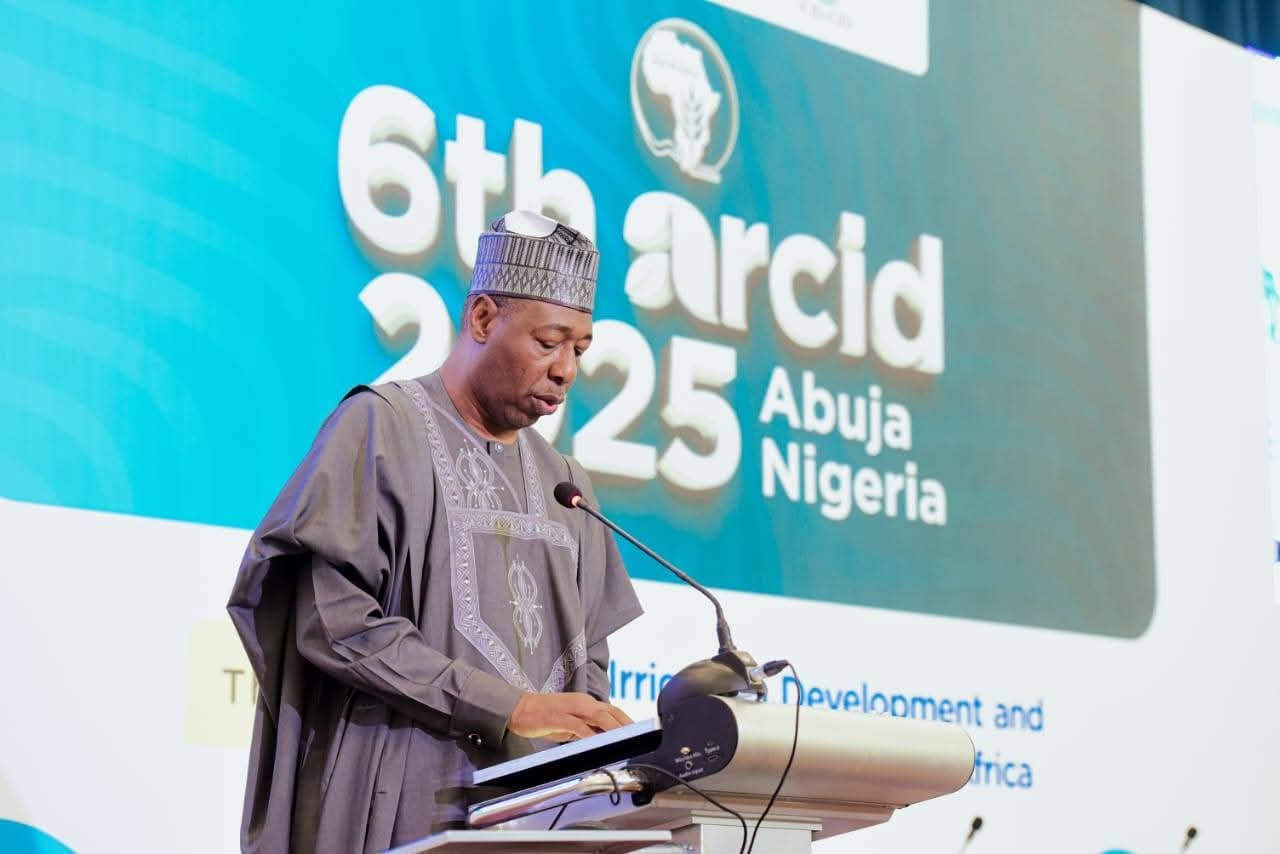Zulum urges African nations to embrace climate-smart agriculture
Borno State Governor, Babagana Umara Zulum, has urged African nations to embrace climate-smart and irrigation-based farming systems to guarantee long-term food security across the continent.
Governor Zulum, who spoke at the 6th African Regional Conference of the International Commission on Irrigation and Drainage (ICID), in Abuja on Monday, said the continent should also implement strategic reforms and enhance investment in the agricultural sector.
“To feed ourselves sustainably, we must rethink how we grow our food. Transitioning from rain-dependent systems to resilient, water-smart approaches is imperative. This involves embracing climate-smart agriculture and developing efficient and inclusive irrigation infrastructure,” he added.
Zulum also highlighted the necessity for comprehensive policy reform, financing mechanisms, transboundary cooperation, investment in water infrastructure, and creating enabling environments for private sector involvement.
The Governor also underscored the importance of safeguarding the rights of communities to shared water resources.
Governor Zulum stressed the need to empower research institutions, promote innovation, and enable the active participation of women and youth in agriculture.
“As a leader from a region facing both climate change and post-conflict recovery, I have seen first-hand how agriculture can restore dignity and rebuild communities.
“In Borno State, we are laying the groundwork for agricultural transformation through sustainable irrigation initiatives.”
He expressed concern over the alarming state of the Lake Chad, which has lost nearly 90% of its original size due to climate change,
The governor warned that the shrinking of the Lake Chad poses serious threat to livelihoods and regional stability.
“Once a source of life for over 30 million people across Nigeria, Niger, Chad, and Cameroon, Lake Chad’s decline is a stark reminder that irrigation is not merely important, but indispensable,” he said.
The governor observed that the erratic rainfall patterns in the continent, and the fact that nearly 65% of Sub-Saharan African farmland is rain-fed, was also a cause of serious concern.
He cited a report of the the Food and Agriculture Organisation (FAO), which stated that the continued unpredictability in rainfall could result in a 50% reduction in crop yields by 2030.
“This is not just a statistic—it is a direct threat to food security, public health, and the future of millions of families.”
Governor Zulum noted the increasing impact of climate change across the continent, including desertification, flooding, drying of water sources, and widespread ecological degradation, and called for an inclusive and innovative approach by smallholder farmers to revitalise the sector.
Despite the daunting challenges, the Governor expressed optimism in Africa’s capacity to overcome adversity, highlighting the continent’s resilience, talent, and creativity.
While commending development partners for their support, he urged them to align their interventions with Africa’s long-term aspirations.
“Irrigation is not merely about water,” he concluded. “It is about ensuring that a farmer in rural Mali, a herder in eastern Kenya, or a displaced family in the Lake Chad Basin can feed their children, live in dignity, and build a future. It is about peace and prosperity.”
The conference was attended by the Secretary to the Government of the Federation, Senator George Akume; Minister of Water Resources and Sanitation, Professor Joseph Terlumun Utsev; the Head of Service of the Federation, Mrs Esther Didi Walson-Jack, and international delegates and other stakeholders.
Governor Zulum was accompanied by Borno State Commissioner for Agriculture, Bawu Baba Musami; Commissioner for Water Resources, Engr. Tijani Alkali Goni, and elder statesman, Dr Musa Inuwa Kubo.




